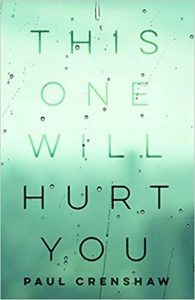I recently decided to expand my reading list to include non-fiction and essays and poetry, and, generally things other than fiction. Not long after this decision, I came upon an essay by Paul Crenshaw. I clicked the link on my Twitter feed, I read the essay, and then a few minutes later I ordered his collection, “This One Will Hurt You.” I dove right in when it arrived, but I decided I would only read one essay every day or so. For some reason I  thought that was the way to digest a collection of essays. Fiction is meant to be binged; I’ve been known to read an entire novel in a single sitting. But essays and poetry should be savored. My approach was flawed, and it failed after the first couple days. I could not stop turning the pages. I read the remainder of the collection in a single sitting.
thought that was the way to digest a collection of essays. Fiction is meant to be binged; I’ve been known to read an entire novel in a single sitting. But essays and poetry should be savored. My approach was flawed, and it failed after the first couple days. I could not stop turning the pages. I read the remainder of the collection in a single sitting.
Reading “This One Will Hurt You” has taught me some things. First, I didn’t think I knew how to read or review a collection of personal essays. I’m comfortable with fiction. I know how to analyze characters and plot. I understand the structure. I suspected the general connection between the two, fiction and non-fiction, would be the prose, the sensory elements, the words and sentences themselves. I was wrong. Stories are stories. Some are attempts at truth based on real events we have experienced, and some are complete lies based on real events we have experienced. As evidence of this truth, you can open directly to page 91 and read one of the best stories/personal essays/poems I have ever read, but I implore you to travel the way Crenshaw intended. To quote Ondaatje, “Meander if you want to get to town.”
The second thing I learned is that I should expand my own writing. As I read Crenshaw’s essays, they evoked memories of my own, things I have experienced that I never considered writing down. Perhaps it was because I grew up around the same time, or that I’ve chosen a similar path for my life. Either way, I connected with these essays more than I expected at the outset. When I came upon this sentence, it made sense: “If the girl is real, then we share the same past in the same place, with a similar hope for leaving it, and I can indulge the notion that we are all trapped by place and circumstance and random forces beyond our control, forever looking back with the sad silly sense that if we could just understand the tragic world we survived as children, we could somehow be better adults, and our lives would fall into the neat categories we have created for them.”
Bottom Line: When I first opened Crenshaw’s collection, I expected to read some good prose. I expected to experience a unique perspective on the world. And I expected to walk away with new insight to my own writing. “This One Will Hurt You” far exceeded those expectations.
Follow Paul on Twitter and order “This One Will Hurt You” on Amazon. While you’re there, you can pre-order his next collection, “This We’ll Defend: A Noncombat Veteran on War and Its Aftermath.”

0 Comments
Comments are closed.